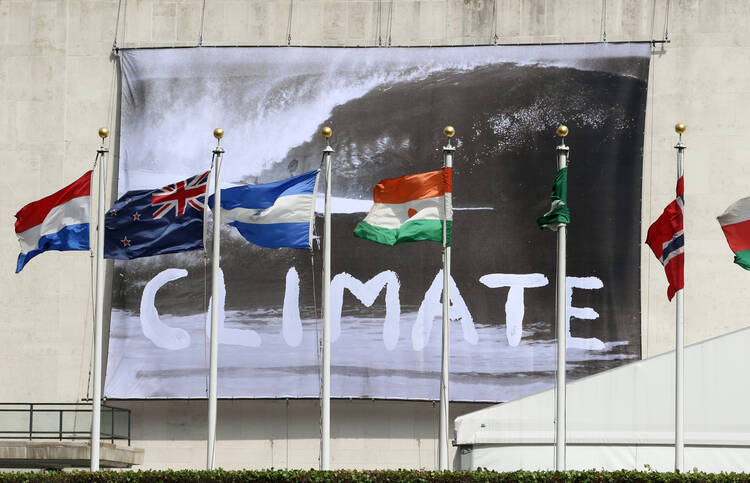Cardinal Peter Turkson, President of the Pontifical Council for Justice and Peace, took “Laudato Si’” on the road, presenting the “green encyclical” from Pope Francis to a packed audience during a special conference at the United Nations on June 30.
Turkson told his U.N. audience that “Laudato Si’” was not ultimately about climate change, “not just about the environment or treating it in isolation,” but a call to “prayerful contemplation of the natural and human ecology.” The encyclical asks us to consider “what kind of world do we want to leave to our children.”
He thinks it's a challenge that the current generation is up to meeting, arguing that despite the difficulty of responding to climate change and other ecological threats it was not too late to “change course and change hearts.” But a process of global dialogue must begin, he said, one that can overcome entrenched ideologies and one that remains driven toward concrete solutions and firm international commitments.
Turkson emphasized the pope’s belief that the problems of poverty and ecological degradation represented an integral global challenge. “Pope Francis recalls how inseparable is the bond between care for nature and justice for the poor,” he said. “When we speak of the environment what we really mean is a relationship between nature and the societies which live in it,” he said. “We are part of nature.”
That means humankind confronts “not two separate crises—one environmental, one social—but one complex crisis that is both environmental and social.” Responding to that crisis must therefore address both components.
Proposing that a global body be entrusted with setting policy meant to respond to climate change, one that can overcome the “great tension” between governments and transnational entities, the cardinal said, “The phenomenon we are dealing with is transnational and cannot be dealt with in any particular place.”
Turkson added that critics who have already charged that the encyclical is anti-business or anti-technology have misunderstood it. He explained “Laudato Si’” represents a critique of a new paradigm of power arising from contemporary technological and economic realities. But, “business is a noble vocation,” he said, which can “continue the work of God” in cooperation with creation. Pope Francis, he said, challenges business people to “use their vocation to benefit and lift up the poor,” the same challenge it issues to people at the forefront of technological change. “Like all things, technology can be abused,” Cardinal Turkson said.
“Laudato Si’” is a call for global dialogue to find concrete solutions to the world’s economic and ecological problems, but it is also a call for dialogue between faith and reason, according to Turkson—one that can be mutually beneficial. “Faith can expose the blind side of reason,” Turkson said, “and reason challenges faith to be concrete and relevant in life.”
Christiana Figueres, Executive Secretary of the U.N. Framework Convention on Climate Change, welcoming Turkson on behalf of U.N. Secretary General Ban Ki-moon, expressed her personal gratitude for the “magnificent encyclical that his Holiness Pope Francis has blessed us with.” Figueres pointed out that this generation’s unique capacity and responsibility to respond to the two-fold crisis of global poverty and climate change.
“We are the very first generation that has all the tools, all the science, all the capital,” she said, “everything it takes to eradicate poverty.” She added at the same time this generation may be the last one capable of mitigating the worst effects of climate change before the process develops an ecological momentum that will become unstoppable.
She described “Laudato Si’” as a document which “calls us all to act in solidarity with the poor and vulnerable, calls us all to act in solidarity with the current young generation and calls us all to act in solidarity with the future’s young generations.”
During his presentation, Cardinal Turkson went to great lengths to detail the process by which the encyclical was brought to completion, apparently in an effort to wave off the kind of textual hairsplitting that has accompanied encyclicals produced by Pope Benedict. Turkson jokingly noted what he called an “exegesis” of papal documents by critics who pulled them apart in hunting expeditions for authorship, folks who claim, “‘I know the pope’s style.’”
Turkson acknowledged that he prepared the first draft after Pope Francis asked him to begin work on a document exploring the themes included in “Laudato Si’,” but stressed the ongoing and detailed hand of the pope in its composition. He said the Vatican team who helped him prepare “Laudato Si’” did so in consultation with leading climate scientists and pointed out that Pope Francis was personally involved in the editing and rewriting process throughout the multiple drafts required to complete the encyclical.
He remained confident that “Laudato Si’” was grounded in the best contempoary science, “the best way to hear the cry of the earth," he said.








